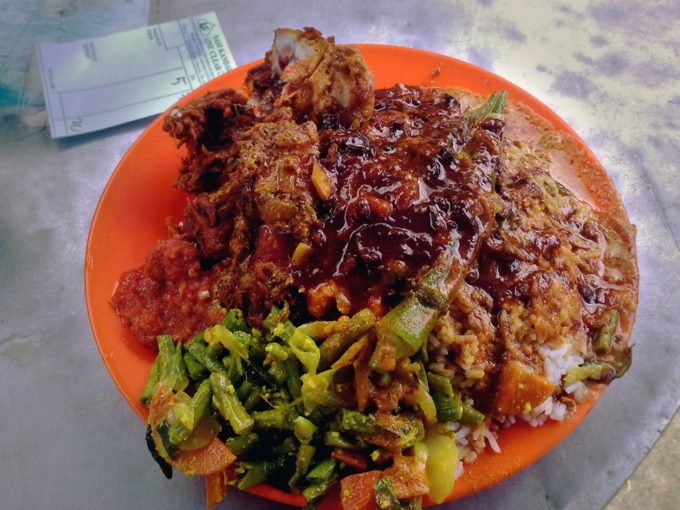
Revisiting a Favorite Breakfast Half a Century Later

Revisiting a Favorite Breakfast Half a Century Later
Nasi kandar in Penang
It is quite a joy when your favorite childhood food tastes the same 50 years later. That is the case with the nasi kandar from my favorite stall. Nasi kandar is a breakfast dish that is unique to Penang, Malaysia’s culinary capital. It is served drenched in a dark beef curry mixed with a fish curry sauce, a match made in heaven. I prefer it with a chunk of beef or two, half a boiled egg, and a couple of bindi (okra).
As I tuck into my nasi kandar breakfast, I am transported back to my childhood when on Sunday mornings, my father would have the nasi kandar delivered to our house. I remember secretly lifting the lid on the tiffin carrier to see the rice, half white and half in tones light to dark brown from the sauce, and nestled underneath, the delicious beef chunks emitting the rich aroma of spices.
Nasi kandar was traditionally pedaled by a hawker carrying the rice and curry in baskets balanced on a pole (kandar). He would usually sell takeaway but those desperate to eat in can perch on a stool and savor the delight right away.
My favorite stall has no name and is perched on the corner of a Chinese coffee shop on Jelutong Road. “The one opposite the Perak Road Police station,” I would hear people shout as directions.
I like to sit and watch the guys serving up the takeaway orders to the queue snaking down to the road. The packer takes the order, a complicated affair as each customer orders a few packs and each with a different combination. “One rice with two beef, half an egg and two bindi, one rice, fish, whole egg, half rice, one beef, half egg and one bindi…” With a powerful memory he passes each order to another guy, who passes it on to the man who dishes it up. The dish is passed to the assistant who throws its contents onto the first layer of a stack of plastic sheets lining a greaseproof paper. The packer flips it this way and that and binds it with a rubber band. By then the next order is ready to be packed.
The stall opens from dawn to 10 am or when they run out of food. The first callers are men returning from dawn prayers at the Jelutong mosque and bleary-eyed factory workers fresh off the night shift, followed by people heading to work, joggers back from a run, and schoolchildren buying a takeaway.
It is a spectacular show when the fresh food is delivered to the stall from the owner’s house, a short distance away, bringing an old tradition to life as they carry the gigantic rice and curry pots on a pole, dodging the heavy morning traffic.